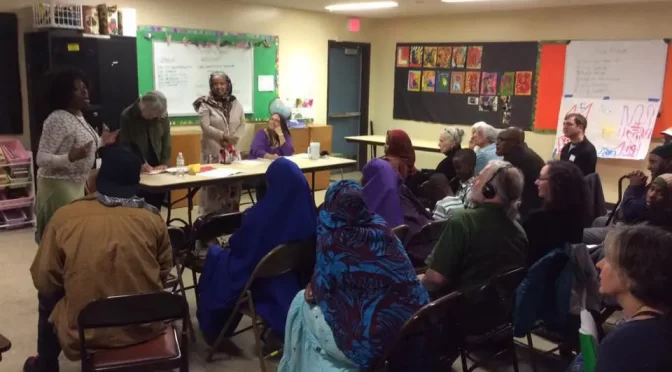Learn more about residents organizing in Minneapolis as Defend Glendale and the fight they’ve been waging for their homes.
Residents of Glendale and the Minneapolis Public Housing Authority (MPHA) have been feuding since May 2015 over the future of the Twin Cities’ oldest public housing. Glendale, located between Prospect Park and the University of Minnesota campus, has 184 townhome units. Most of its 600 residents are African Americans or East African and Hmong immigrants.
Last year the MPHA took a proposal for a Rental Assistance Demonstration (RAD) redevelopment project for Glendale to the Minneapolis City Council. The proposal would have included private development, replacing Glendale’s townhomes with five-story, mixed-income apartment buildings and relocating current residents during construction. Glendale residents, who had not been consulted in advance, were outraged.
Organized as Defend Glendale, residents vehemently opposed both the idea of privatization and any proposal to move them out of their current homes and community. Cam Gordon, who represents the area on the city council, said that the council was concerned about lack of community input, so they decided to “to stop everything before it went forward,” and told MPHA to come back with a new plan after consultation with the community.
According to MPHA Director of Policy and Special Initiatives Bob Boyd, “Discussions about RAD got so messy and residents were so fearful that MPHA decided that we would drop the RAD option.” Boyd says that neither privatization of any kind nor relocation of residents away from Glendale, even temporarily, are presently being considered as options.
That sounds like a win for Defend Glendale, but its leaders still do not trust the MPHA. Defend Glendale campaign organizer Ladan Yusuf cites one recent example of the conflicts that undermined trust over the past year. She says that residents have been pressured to consider moving during annual income recertification meetings.
“They take this time when they show a lot of power and it’s intimidating to people, in a small room,” Yusuf says. “It’s subliminal messaging, emotional manipulation, all kinds of things.”
By Mary Turck
Read more: Mpls Public Housing residents fight redevelopment plan
